I’ve been in Bangladesh for more than two months now, working with CARE Bangladesh on their programming to help rural farmers improve their agricultural practices – and incomes.
I’m specifically working on strengthening the dairy value chain. The dairy industry in Bangladesh is underdeveloped, but there is lots of potential for growth. The majority of the milk in Bangladesh is imported from India and China, but so many cows here are underutilized.
Milk is collected in many parts of Bangladesh through the aggregation of dairy in a single community. All the milk is collected from the dairy farmers, the average fat content is measured, and then farmers are paid out for the average fat content rate. The higher the fat percentage content, the more they are paid per litre.
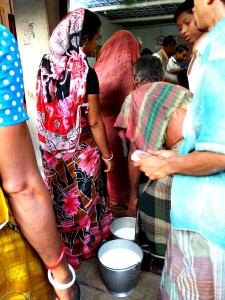
Dairy producers line up with their milk for testing and collection.
The problem with aggregating all the dairy is that this system doesn’t give farmers incentives to invest in their livestock through better quality feed, appropriate medicines to administer when a disease is contracted, or other methods of promoting a healthier, more productive herd. It’s simply a race to the bottom. What motivation does an individual dairy farmer have to increase their cow’s dairy fat content if they’re paid out for the entire village’s average fat content?
Seven years ago, CARE Bangladesh introduced digital fat testing (DFT) machines in the northwest region of Bangladesh. These machines measure the fat percentage of an individual dairy farmer’s milk on the spot.
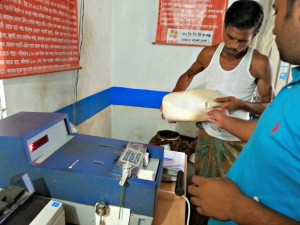
A digital fat testing machine is used to determine the fat content in the milk.
The machine spits out a receipt that reads out the amount of dairy collected at the milk collection site, the fat content of the milk, and the total amount owed to the dairy producer. With this simple technology, dairy farmers are paid on a fair, transparent basis.
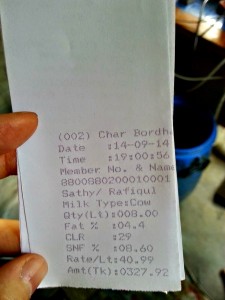
A printout from a digital fat testing machine.
From the milk collection point, the dairy is then transported to a chilling plant that is operated by BRAC, the largest NGO in the world. Then the milk is transferred to a processing plant in Dhaka. More than 30,000 smallholder dairy producers participate in the DFT milk collection system, and the project is still growing.
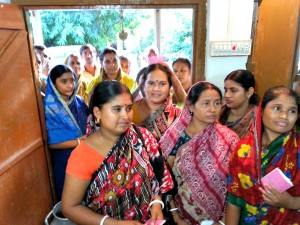
Members of the community gather at a milk collection point in rural Bangladesh.
CARE wants to make DFT machines the industry standard. That’s the way milk is collected in India, so why not in Bangladesh? This is my first project in Bangladesh: create a business case that outlines the economic and social benefits of DFT machines. How much have dairy producers’ incomes grown year over year? How has quality of milk improved over time? How much time and financial resources can BRAC save with milk collection by implementing DFT machines nationwide? The business case will be presented to BRAC leadership, with the hopes of expanding DFT machines beyond the northwest region of the country.
As CARE carried out this DFT project, they noticed that there was demand from the community for high quality agro-inputs for farmer’s livestock. An agro-input includes feed, medicine, artificial insemination and other services to maintain healthy livestock. In rural areas, there was no consistent agro-input shop that could provide quality products and services to farmers, and without this, the quality of the livestock dairy would be compromised, which created a domino effect on the economic livelihood of the dairy producers.
Two years ago, CARE opened Krishi Utsho, a microfranchise network of agro-input shops serving smallholder dairy producers. With the weight of CARE’s brand name and high quality medicine and feed products available at these shops, Krishi Utsho has begun to take off in the Bogra and Rangpur regions. There are currently 34 shops in the network, but the social enterprise is aiming to open 100 shops by 2017. This initiative also creates employment for the shop owners, who learn how to run a business and how to increase their incomes through the shop.
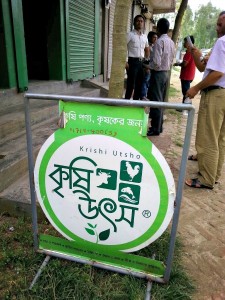
A sign outside a Krishi Utsho shop in Bangladesh.
Working with Krishi Utsho is the second part of my Fellowship work here in Bangladesh – as a management consultant, I am developing a business plan and providing some strategic guidance. For example, how do we define Krishi Utsho’s value proposition in the marketplace? How can we ensure that farmers shop at Krishi Utsho? How can we increase our margins from the products that are sold in the shop? Which suppliers have the best products on the market?
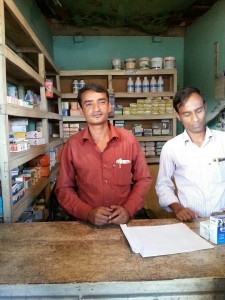
The proprietor of a Krishi Utsho shop.
I’m creating a business plan and financial model for Krishi Utsho. I work with two management-level employees at the CARE Bangladesh head office. I have Field Facilitators conducting surveys with shop owners, and I’m going out to the field in a couple weeks to interview shop owners myself to see how we can improve shop performance. That’s where my previous experience has really been a benefit: having worked in a similar role for a major retailer in North America, I know exactly how retail works, how to streamline operations, and how to make things more efficient. I know the metrics to use to monitor shop performance, and I know a few things about how to drive foot traffic and sales into shops.
I’m two months down and six more to go in Bangladesh. Slowly but surely, things are moving along at CARE and it’s a pretty neat ride to be on.
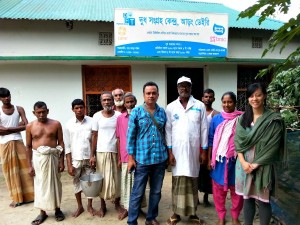
The author, IMM Fellow Jenn Wong (far right), in front of a milk collection point with CARE employees and locals, in a remote village outside Bogra, Bangladesh.
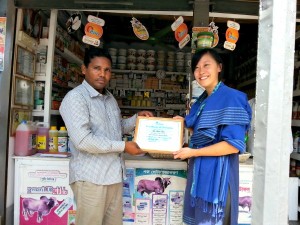
The author, IMM Fellow Jenn Wong, presenting a certificate of training to one of the shop owners in CARE Bangladesh’s social enterprise, Krishi Utsho.
